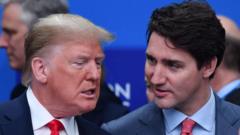In a wave of backlash, officials from Canada, Mexico, and China are expressing deep worries over President-elect Donald Trump's intentions to impose substantial tariffs on these countries. The move, aimed at addressing issues like drug trafficking and illegal immigration, threatens to disrupt the economies of not just the U.S., but its key trading partners as well.
Mexican President Claudia Sheinbaum indicated that retaliatory actions would likely ensue if tariffs are set in motion, stating, "One tariff will follow another in response and so on, until we put our common businesses at risk." Trump has announced a plan to impose a 25% tariff on imports from Mexico and Canada, along with a 10% tariff on goods from China, marking a contentious start to his presidency.
Canadian Prime Minister Justin Trudeau has swiftly reached out to Trump for dialogue, suggesting a willingness to collaborate constructively. Trudeau was quoted saying, "This is a relationship that we know takes a certain amount of working on, and that's what we'll do." However, the issue remained muddied as Trump’s team chose not to acknowledge the details of their recent call.
On the other hand, Mexico has expressed concern regarding the link between tariffs and drug consumption, with President Sheinbaum stating that “neither threats nor tariffs would solve the migration phenomenon." She underscored that any imposed tariffs would hurt U.S. businesses, especially U.S. car manufacturers who rely on parts produced in Mexico.
China's response is rooted in the notion of mutual benefit in trade relations. A spokesman for the Chinese embassy in Washington emphasized cooperation as foundational, rejecting allegations that China allows substances like fentanyl to flow illegally into the U.S. He labeled the notion as “counter to facts and reality.”
The economic repercussions of such tariffs could extend beyond political rhetoric. Trudeau noted that "the idea of going to war with the United States isn’t what anyone wants," urging lawmakers to remain composed in their response. With a significant portion of Canada’s exports directed towards the U.S., officials fear that tariffs could severely impact both job markets and financial stability.
As reactions unfold, Canadian provincial leaders are also considering potential tariffs on U.S. imports, reinforcing the sentiment that trade ties run deep and mutual dependency exists. The economic landscapes of both nations could face considerable turmoil based on these impending policies.
Market responses are already apparent; both the Canadian dollar and the Mexican peso have seen notable declines in value in reaction to Trump's announcements, signaling potential broader economic instability.
As countries brace for these developments, all eyes turn to the U.S. to see how relations, trade, and policy will evolve under President Trump’s leadership amidst looming tariffs.




















